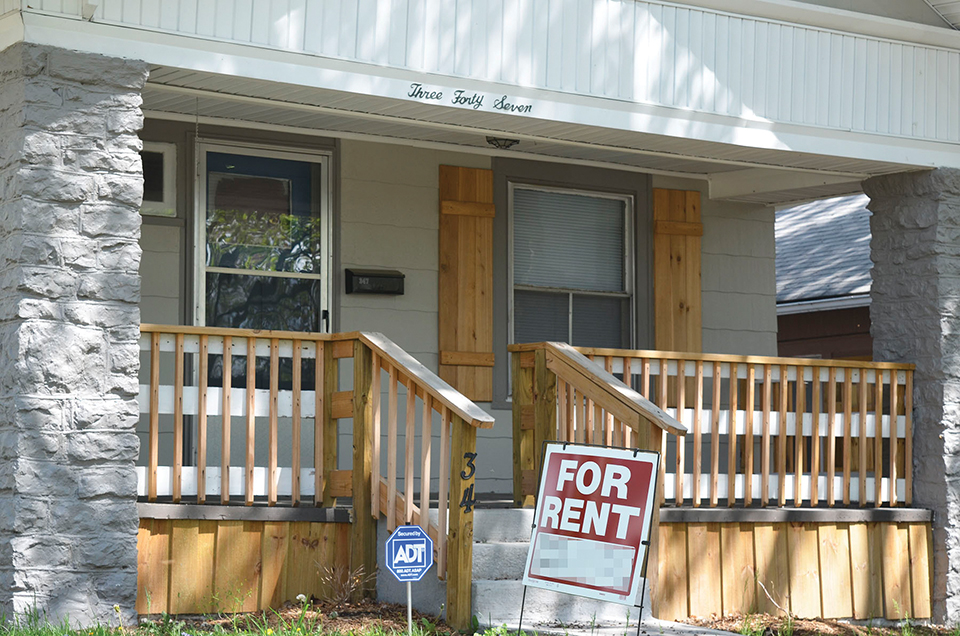Note: this story has been updated to reflect the actions taken during the Wednesday, August 1 Neighborhoods and Public Safety committee meeting.
The full Kansas City, Missouri City Council will have a chance to pass an ordinance that allows victims of domestic violence, sexual assault, and stalking to get out of their housing contracts when they convene on Thursday, August 2.
Potential amendments to Ordinance No. 180516 were discussed over two weeks by an engaged Neighborhoods and Public Safety committee, which voted unanimously to recommend a committee substitute during its meeting on Wednesday, August 1. City attorney Martha Means presented alterations to the ordinance language that would allow victims to terminate a lease agreement without penalty as long as they provided a police report or an order of protection to their landlord that confirmed the victim’s circumstances.
The committee worked through some remaining hang-ups in the ordinance language before recommending the legislation. Chair Alissia Canady, for instance, had concerns that a police report was not sufficient documentation of a domestic violence offense.
“Anybody can make a police report,” Canady said. “I don’t think we should make this an easy tool to utilize in that manner.”
Ultimately, the committee decided to swap out the option to provide a police report to a landlord as acceptable documentation. Instead, the committee included the option to provide a letter from a medical provider confirming that a domestic violence, sexual assault, or stalking incident had occurred. Ordinance sponsor Jolie Justus said it was important to include an option outside of just an order of protection, because victims don’t always know who committed the crimes.
“For survivors of sexual assault, oftentimes they don’t know who the perpetrator is,” Justus said. “Most landlords are going to do this; but this is for the landlords who don’t do this.”
Though Means acknowledged that the ordinance could be difficult to enforce, the committee ultimately agreed that providing even a limited tool to victims of such crimes is better than having nothing at all.
“The typical person for whom this could be useful is someone who has just suffered domestic violence and sexual violence,” said 3rd District Councilman Quinton Lucas. “This gives them another tool in a fairly small tool bet of options to get them out of a negative situation.”
While Lucas agreed with Means that judges aren’t required to consider city ordinance violations before they issue judgments, he countered that the paper trail provided by the ordinance changes could prove compelling in a court of law. To make his point, Lucas pointed to a couple of different possible defenses.
“One is of duress in the contractual obligation, and the other is the duty to mitigate for the landlord,” Lucas said. “I actually think this does some good even for the domestic violence victim who finds themselves in Jackson County or Clay County circuit court.”
Canady summed up the potential utilization of the legislation before the unanimous vote.
“I think it can be a very helpful tool, but again, it’s not absolute,” Canady said.
The original version of this story is below:
An ordinance that would allow domestic violence victims to terminate their lease agreements was held by the Neighborhoods and Public Safety (N&PS) committee on Wednesday, July 25 after nearly two hours of debate and testimony on the legislation failed to generate consensus.
Amendments proposed to Sections 50-109 of Ordinance No. 180516 – which relates to “unlawful acts by landlords and tenants of residential premises” – would offer protections for victims of domestic violence, sexual assault or stalking. Additionally, the new language proposed for the ordinance would allow any such victims to “terminate a lease and quit the premises upon providing the landlord written notice and a copy of any order of protection issued for the tenant or the tenant’s dependent pursuant to state stature.”
Any landlord found in violation of that language, if it is eventually adopted, would be subject to a fine of up to $500 and a prison sentence of up to six months. Fourth District Councilwoman Jolie Justus, who presented the ordinance amendments to members of the N&PS committee, said that the new rules would take effect on August 17 of this year. Due to legal concerns about altering existing contracts, the ordinance would not be retroactive; meaning that only lease agreements signed after August 17 would be subject to the ordinance requirements. Justus further noted that the language would allow the city prosecutor to bring charges against landlords who refuse to release domestic violence victims from their leases.
Questions remained, however, about the legal implications of the new law. Committee chair Alissia Canady, a 5th District Councilwoman, wondered how the ordinance would impact citizens who are repeat victims of domestic violence. Canady constructed a hypothetical: what if a victim gets out of a lease and moves to a new domicile, but then their stalker finds the new address and continues predatory behavior: can victims use the same documentation as before to move again? Would victims be required to disclose the circumstances around their prior move to prospective landlords? What if the victim does disclose those circumstances, and a landlord discriminates against them on those grounds?
To Canady, there were too many scenarios left unexplained in the legislation to pass it as constructed on July 25. One idea, offered by Canady and 4th District Councilwoman Katheryn Shields, would be to broaden the ordinance to make it easier for tenants to extract themselves from a bad living situation.
“Should we be focused on specific acts, or provide a relief mechanism that’s more broad?” Canady wondered.
Canady also pointed out that though the ordinance states that landlords must release tenants from their leases in the event of domestic violence, sexual assault, or stalking, she hasn’t received a sufficient answer on the financial implications of the legislation. What if the lease says that you still owe the landlord money?
“There’s nothing in this ordinance that addresses that, or even attempts to address that,” Canady said.
Domestic violence advocates who lined up to offer support for the ordinance were less concerned with the legalese. Lisa Fleming of the Rose Brooks Center said that domestic violence victims are always at risk of further violence, adding that there is presently an unfair economic toll – having an eviction on their records – for victims who choose to leave a dangerous situation.
“This is yet one more impactful and logical measure for saving lives,” Fleming said.
Leslie Bush answers the hotline at the Rose Brooks Center, and she told Council members that she often has the unenviable task of telling victims that Rose Brooks Center doesn’t have any space for them. She added that roughly 80% of mothers living with children in homelessness are victims of domestic violence, and urged the N&PS committee members to pass the measure before them.
“As a social justice advocate and Kansas City resident, I ask you to make this change for our city and set an example for other municipalities,” Bush said.
Initially, the committee appeared keen to approve the ordinance amendments with some tweaks. For instance, 3rd District Councilman Quinton Lucas suggested broadening the requirements to get out of a lease on the grounds of domestic violence by allowing tenants to do so not only with a protective order, but also with a police report or documentation from a health care provider. The idea was taken well by ordinance sponsor Justus.
“I like the idea of a police report,” Justus said. “I’m open to the idea of some sort of documentation from a health care provider…that to me would be another thing that we should look at.”
Lucas’s subsequently proposed committee substitute, however, failed to gain traction with the rest of the committee as members began questioning the potential legal repercussions of the legislation.
“We’re basically saying we’re going to interrupt a lease that was entered into by two consenting sides,” said Shields. “What is the City’s legal right to interfere in the contracts?”
Throughout the conversation, Lucas emerged as a strong proponent of the legislation proposed by Justus. He described personal stories from his childhood; specifically, of watching his own mother continue to live with an abuser because she could not afford to extricate herself from the situation.
What the City is proposing, Lucas argued, isn’t a burden to any well-meaning landlords in the area.
“We’re not really changing contracts at all,” Lucas argued. “As a City we’re creating an ordinance violation if you try to force money out of the person after they’ve terminated the lease.”
Still, there were enough legal questions brought up by the committee that Canady decided to hold the ordinance for a week.
“We’ll hold it for one week, and we’ll have a discussion with the law department,” Canady said.
The decision came as a disappointment for Lucas.
“I was very surprised. I think it is a common sense piece of legislation,” Lucas said. “As Councilwoman Justus put it, this is really just to suggest that landlords think about it before trying to penalize someone who left a residence due to an occurrence such as sexual or domestic violence.”
Despite the setback, Lucas remained hopeful that a version of the ordinance amendments could be passed when the committee returns to the issue on August 1. That said, he wants to ensure that the spirit of the new legislation remains intact through any edits.
“I hope we can come to some agreement that this is a protection we want,” Lucas said. “This is one less thing to worry about while you’re trying to find a home for your children.”
The Neighborhoods and Public Safety committee is scheduled to take up the ordinance amendments again during its next scheduled meeting, at 10 a.m. on Wednesday, August 1.



















